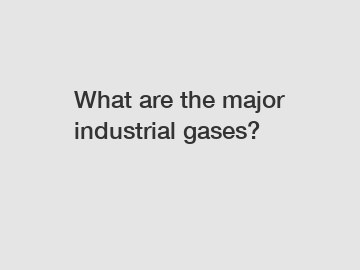What are the major industrial gases?
Industrial gases play a crucial role in various industries around the world. These gases are widely used in sectors such as manufacturing, healthcare, food and beverage, electronics, and more. They are essential for a wide range of processes, from welding and cutting to cooling and preservation. This article aims to explore the major industrial gases and their applications.
Oxygen.
Oxygen is one of the most important industrial gases and is widely used in numerous industries. It is pivotal for combustion processes, such as fuel burning and metal cutting, making it a vital component in the metal fabrication and manufacturing sectors. Oxygen is also used in medical applications for patients with respiratory problems.

Nitrogen.
Nitrogen is another essential industrial gas with various applications. It is commonly used in industries such as food and beverage, pharmaceuticals, and electronics. In the food and beverage industry, nitrogen is used for packaging products to enhance shelf life by reducing spoilage and preventing oxidation. It is also used in the electronics industry during the manufacturing of semiconductors and liquid crystal displays (LCDs) to create a controlled atmosphere that prevents oxidation.
Carbon Dioxide.
Carbon dioxide (CO2) is a widely recognized industrial gas used in diverse applications. It is commonly employed in the food and beverage industry for carbonation, giving soft drinks their sparkling bubbles. CO2 is also used for cooling and freezing applications in the food industry and is a crucial part of many fire suppression systems in buildings and aircraft. Additionally, this gas has applications in the medical field, where it is used to provide patients with a controlled supply of breathable gas during surgery or to assist with respiratory conditions.
Argon.
Argon is an inert industrial gas widely used for its properties that allow it to create stable and controlled environments. It is commonly used in the welding industry to shield the weld area from the atmosphere, preventing oxidation and ensuring high-quality welds. Argon is also used in the production of specialty glass, such as double-glazed windows, as its insulation properties are superior to regular air.
Acetylene.
Acetylene is a highly flammable industrial gas widely used for fueling cutting torches. It produces an intense and localized flame, making it ideal for cutting and welding metals. Acetylene is often combined with oxygen in a welding torch to provide the necessary heat and combustion.
Hydrogen.
Hydrogen is another versatile industrial gas with numerous applications. It is commonly used in the petrochemical industry for the production of ammonia, methanol, and other synthesis processes. Hydrogen is also used in the electronics industry for plasma etching, thin film deposition, and wafer cleaning. Additionally, it is an emerging alternative fuel for vehicles due to its potential as a clean and sustainable source of energy.
In conclusion, industrial gases play a vital role in various industries worldwide. Oxygen, nitrogen, carbon dioxide, argon, acetylene, and hydrogen are among the major industrial gases used for a multitude of applications. From metal cutting and welding to preservation and packaging, these gases are essential in enhancing efficiency and meeting industry requirements. If you have any further questions or need assistance with industrial gases, please feel free to contact us.
If you are looking for more details, kindly visit sulfur tetrafluoride gas, octafluorocyclobutane gas, specialty gas supplier.

Comments
0